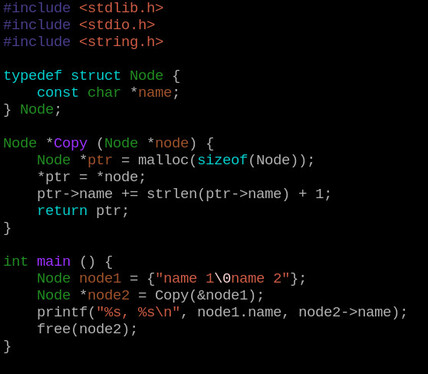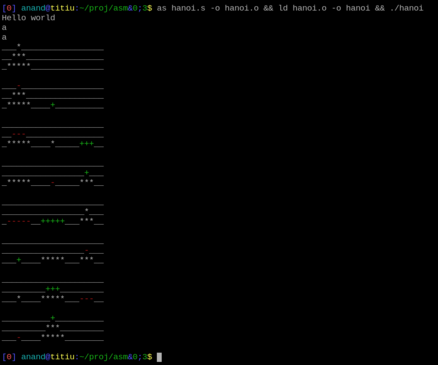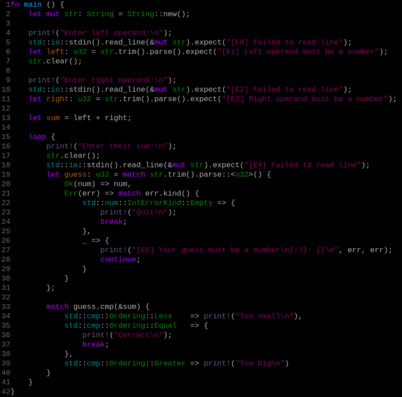Anand :terminal: :gnu: :linux: · @anand7253
16 followers · 155 posts · Server fosstodon.orgI'm back to coding my browser again. Making the padding colourful, not just the borders improved my tester's experience drastically. After a little other cleaning the code and output both look better :)
Anand :terminal: :gnu: :linux: · @anand7253
16 followers · 147 posts · Server fosstodon.orgI'm language-hopping again.
Now I hopped from #Ruby to #Perl, earlier I have visited #Rust.
Perl isn't difficult, not with my XP.
I do have syntax problems, but once I developed an intuition for what a sigil means using the language gets smoother.
I do have the feeling I can concentrate on the task with less worrying about the types.
#ruby #perl #rust #programming #doitmyself
Anand :terminal: :gnu: :linux: · @anand7253
16 followers · 146 posts · Server fosstodon.orgGot it!
/usr/share/X11/xkb/rules/base.lst:887: caps:swapescape Swap Esc and Caps Lock
This needs to be added to Option "XkbOptions" in /etc/X11/xorg.conf.d
I haven't tested it yet, it might require an X reboot and I'm looking at another way, that I already found, to swap the 2 keys.
This will be fun.
It might not end at escape and caps lock... :)
That will be more fun.
Btw I used ArchWiki :)
Anand :terminal: :gnu: :linux: · @anand7253
16 followers · 146 posts · Server fosstodon.orgI've just tracked down a really annoying Lua bug in my Minetest mod.
In Lua, assigning a table to a variable is assigning the reference to the table, not a copy of the table, while in C++, to which I'm used to unless I explicitly want the variable to store a pointer or reference, stuff will be copied.
Fixing the bug is easy: var = table.copy(mytable), but finding it wasn't.
table.copy is a small convenience function added by Minetest
[1/2] #Minetest #Lua #DoItMySelf #Programming #Bug
#minetest #lua #doitmyself #programming #bug
Anand :terminal: :gnu: :linux: · @anand7253
16 followers · 146 posts · Server fosstodon.orgA few days ago I edited one of my Minetest mods over ssh... 😆
I couldn't test it, but it didn't matter.
Soon I could access the computer directly
#programming #minetest #doitmyself
Anand :terminal: :gnu: :linux: · @anand7253
16 followers · 146 posts · Server fosstodon.orgStackOverflow is a nice C problemset.
Solving an unanswered question would be fun even if you didn't post your answer.
#stackoverflow #c #programming #doitmyself
Anand :terminal: :gnu: :linux: · @anand7253
16 followers · 146 posts · Server fosstodon.orgI don't care about doing stuff the right way.
I do it in an effective way that works.
For example: I have a function that recursively copies a small tree, built on the stack with pointers to rodata, each node has a name assigned to it.
How do I make the nodes from one tree have different names to those of the nodes from the other tree?
Simple.
#programming #c #doitmyself #programmingstyle
Anand :terminal: :gnu: :linux: · @anand7253
16 followers · 146 posts · Server fosstodon.orgI'm starting to insert comments into my #HTTPclient redo to remember the meanings of variables.
I know the variable names should speak for themselves, but they don't... as usual :blobcatnotlikethis: :blobcatshrug:
#httpclient #programming #doitmyself #programmingstyle
Anand :terminal: :gnu: :linux: · @anand7253
16 followers · 146 posts · Server fosstodon.orgI won't use any big blob of software like Chromium-based WebContent, because I want my browser to be secure, that is security must be kept in mind through the whole process of programming, not be left for extensions to manage.
[3/3] #programming #c #doitmyself
Anand :terminal: :gnu: :linux: · @anand7253
16 followers · 146 posts · Server fosstodon.orgAgain I had a look at a graphics library, this time only Qt. It has some good features, but since I want to implement everything (HTML, CSS; JavaScript if I want it at all) from scratch it doesn't make sense to use a high-level library that has it already implemented.
So I'm back to SimpleDirectmediaLayer.
[2/3] #programming #c #doitmyself
Anand :terminal: :gnu: :linux: · @anand7253
16 followers · 146 posts · Server fosstodon.orgThe HTML rendering part of my C++ HTTP client got a bit too messy, so I'm starting it again from nothing.
This time no sockets, no network, no URLs, no parsing HTML, no fighting against C++ inheritance and order of construction, just rendering protoHTML in plain, good old C.
[1/3] #programming #c #doitmyself
Anand :terminal: :gnu: :linux: · @anand7253
16 followers · 146 posts · Server fosstodon.orgSince a few days ago I've been playing around with system calls in #assembly. I started in the direction of a TCP/IP6 echo, now I'm introducing ptrace.
Works fine, the part that's implemented.
#programming #doitmyself
#assembly #programming #doitmyself
Anand :terminal: :gnu: :linux: · @anand7253
16 followers · 146 posts · Server fosstodon.orgA finite while loop succeded:
var g := 5; while (g) g -= 1;
I'm steadily moving forward.
Next I'll fix my compiling which still doesn't support the 'if' conditional statement.
#programming #languageprogramming #doitmyself
Anand :terminal: :gnu: :linux: · @anand7253
16 followers · 146 posts · Server fosstodon.orgNow I see that it's too hard to both execute and compile at the same time, so my #assembly is still in bits and pieces, but it slowly takes some shape.
In the mean time I continue with the 'while' loop.
#assembly #doitmyself #languageprogramming #programming #cpp
Anand :terminal: :gnu: :linux: · @anand7253
16 followers · 146 posts · Server fosstodon.orgI'm now reading and parsing 1 command line argument to get the size from the user.
After playing around with time (I mean the #bash buitin, haha), I think now, with #assembly I finally see the point of scattered/gathered I/O.
It might even be convenient.
#bash #assembly #programming #doitmyself
Anand :terminal: :gnu: :linux: · @anand7253
16 followers · 146 posts · Server fosstodon.orgThis was just a silly error, I got confused and used a variable as both a table index and an iterator/subtable/pointer-to-subtable/pointer-to-element.
#Assembly is easy. Sometimes I get blocked by an error and it's hard to find it, but once it's fixed it goes on smoothly.
Up to the next #bug :)
Here's what I've manages so far:
Hanoi towers with a hardcoded size.
#assembly #bug #programming #doitmyself
Anand :terminal: :gnu: :linux: · @anand7253
16 followers · 146 posts · Server fosstodon.orgSome :rust #rust concepts I already like, some not yet, but with the book, docs, rustc --explain and my #programming experience it's easy to learn.
#doitmyself
#rust #programming #doitmyself
Anand :terminal: :gnu: :linux: · @anand7253
16 followers · 146 posts · Server fosstodon.orgThe write(2) system call returns -EFAULT (Bad address)
Why do I need to check %rax even after outputing to a terminal?
#programming #assembly #doitmyself #bug
Anand :terminal: :gnu: :linux: · @anand7253
16 followers · 146 posts · Server fosstodon.orgMy #assembly #bug was I loaded a 64bit register from 52(%rsp) instead of 56(%rsp).
And since I have a little endian CPU and 48(%rsp) and 56(%rsp) were both below 2^32 the value was 2^32 times too big.
How could I think that 52 is divisible by 8???
I needed it to be prinited in hex as 0x34 by #gdb to notice it's not.
#assembly #bug #gdb #programming #doitmyself
Anand :terminal: :gnu: :linux: · @anand7253
16 followers · 146 posts · Server fosstodon.orgI generated a SIGSEGV for my #assembly program by typing
print (long long) 40($rsp)
in #gdb
Ok, I know I expected a #SegmentationFault near that point, and my code contains
mov 40(%rsp), %rax
but the SIGSEGV should be raised a few instructions after this movq, when dereferencing a derivative of this 40(%rsp) and at both points (this gdb print and the normal SIGSEGV point) the stack pointer looks ok.
#assembly #gdb #SegmentationFault #programming #doitmyself #bug


